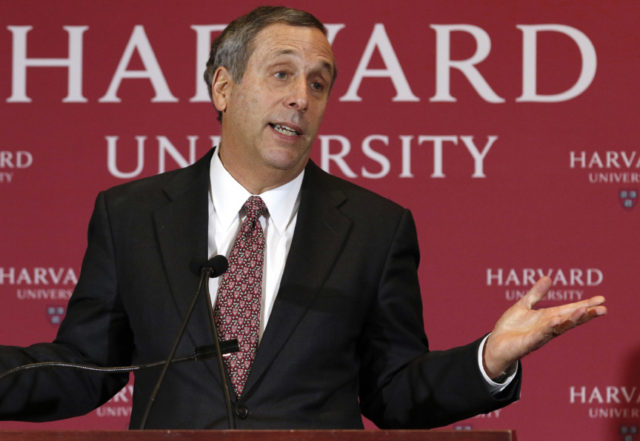Harvard has apologized to victims nearly 40 years after they were harassed by a professor at the university. The women are now calling on the school to change how it investigates sexual misconduct.
Four women who were victims of sexual misconduct by former Harvard professor Jorge I. Domínguez wrote a letter to University President Lawrence S. Bacow on Friday, in the wake of his public apology, according to a report by the Harvard Crimson.
In their letter, the women thanked Bacow for the apology, but said that they take issue with the existing procedures to investigative sexual harassment allegations at Harvard being considered “adequate to redress faculty misconduct.”
“Harvard is unwilling to take upon itself the burden of holding powerful faculty members accountable,” the women wrote. “Simply, we have watched Harvard’s staff and procedures silence and harm victims, especially those who have suffered the most egregious conduct, including quid pro quo sexual harassment and sexual assault.”
Last week, nearly 40 decades after the harassment, Bacow apologized to the victims on behalf of Harvard University.
The apology accompanied the final report by an external committee tasked with determining what had allowed Domínguez to climb Harvard’s ranks despite multiple allegations of harassment over several decades, reports the Crimson.
“Harvard failed her,” said Bacow of one of the victims, Terry Karl, who was an assistant professor at the university in 1983.
“I also apologize to those whose subsequent sexual harassment might have been avoided if Harvard had taken timely and appropriate actions,” added Bacow.
“As much as this apology and President Bacow’s words mean to me personally, and as st[r]ongly as I believe that they are due to so many other women, I fear that the changes that need to be made to redress systemic harassment and discrimination at Harvard and other universities still lie in the future,” wrote Karl in a statement to the Crimson.
“Our advocacy to make changes not only at Harvard but also in Title IX and the US Dept of Education has only just begun,” she added.
In their letter on Friday, Karl and Sherman — who were joined by two other victims, Suzanna Challen and Nienke Grossman — said that given Harvard’s recent handling of sexual harassment allegations, they feel “unable in good conscience” to encourage women to use current procedures in the Title IX Office and Office for Dispute Resolution to report misconduct by tenured faculty members.”
“[Harvard] fails to provide basic supportive measures to community members risking their professional futures to expose harassment and misconduct,” the letter reads.
The women went on to acknowledge that the recent formation of an internal committee and working groups composed of current students, faculty, and staff to review the University’s sexual misconduct, discrimination, and bullying policies are “a step in the right direction.”
“However, the direct input of individuals with personal knowledge and interaction with its procedures, including Title IX and ODR, is critical to their legitimacy and success,” the letter adds. “Allow our lived experience to help Harvard effectuate real change.”
In a separate email to Harvard, Karl urged the university to take immediate action in addressing past failures and preventing future sexual misconduct on campus.
“Change is pushed by the bottom when it is not carried out by the top,” wrote Karl. “Apologies, remedies to victims, justice, and memory are essential in building a better future at Harvard and in our world. But if the past is to prove instructive, it must be fully revealed — or institutional cover-ups will continue.”
You can follow Alana Mastrangelo on Facebook and Twitter at @ARmastrangelo, and on Instagram.

COMMENTS
Please let us know if you're having issues with commenting.